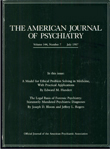Family diagnoses missed on a clinical inpatient service
Abstract
Methods for taking family psychiatric histories have been developed primarily for research rather than clinical settings. The authors compared family histories obtained independently by a research team and by PGY-3 residents on 52 consecutively admitted adult psychiatric inpatients. In contrast to the residents, the research team used a family tree, screening questions, and a structured interview based on diagnostic criteria and identified more than four times as many diagnoses in relatives as did the residents. The results demonstrate that a family history strategy derived from research methodology significantly enhances the gathering of important diagnostic information in a clinical inpatient setting.
Access content
To read the fulltext, please use one of the options below to sign in or purchase access.- Personal login
- Institutional Login
- Sign in via OpenAthens
- Register for access
-
Please login/register if you wish to pair your device and check access availability.
Not a subscriber?
PsychiatryOnline subscription options offer access to the DSM-5 library, books, journals, CME, and patient resources. This all-in-one virtual library provides psychiatrists and mental health professionals with key resources for diagnosis, treatment, research, and professional development.
Need more help? PsychiatryOnline Customer Service may be reached by emailing [email protected] or by calling 800-368-5777 (in the U.S.) or 703-907-7322 (outside the U.S.).



